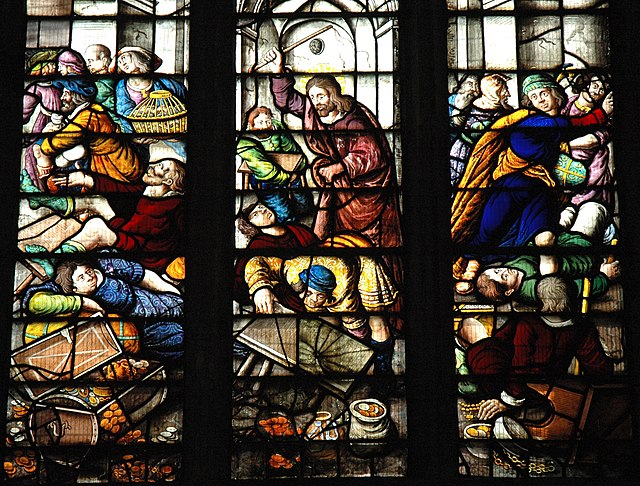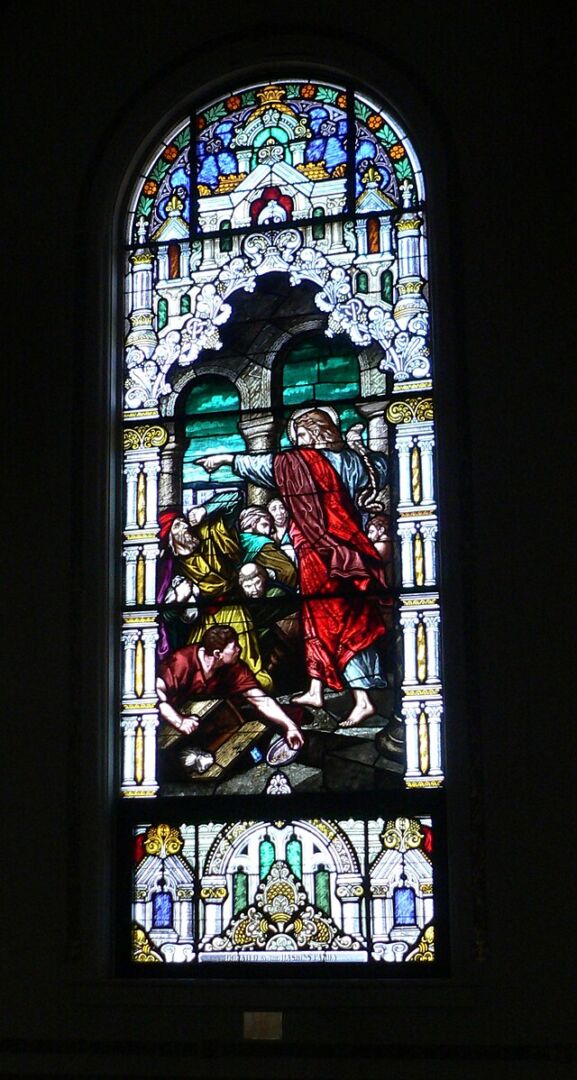Franciscan Friar Fr. Paul Gallagher reflects on the Gospel text for the Third Sunday of Lent. The Gospels do not record many occasions when Jesus became angry. Can you think of other times? Can you think of other times he used physical force? How does that awareness affect how you hear this Gospel text?
The content is edited by Franciscan Sister of Christian Charity Sister Anne Marie Lom and Joe Thiel. The excerpts from the Sunday readings are prepared by Joe Thiel. To read or download the complete pdf with excerpts for your prayer, please click here Franciscan Gospel Reflection March 3 2024. Excerpts are from the Lectionary for Mass for Use in the Dioceses of the United States of America, second typical edition © 2001, 1998, 1997, 1986, 1970 Confraternity of Christian Doctrine, Inc., Washington, DC. Used with permission. All rights reserved. No portion of this text may be reproduced by any means without permission in writing from the copyright owner. Photos:Mike Knell, CC BY-SA 2.0 <https://creativecommons.org/licenses/by-sa/2.0>, via Wikimedia Commons; Ammodramus, Public domain, via Wikimedia Commons
John 2:13-25
Since the Passover of the Jews was near, Jesus went up to Jerusalem. He found in the temple area those who sold oxen, sheep, and doves, as well as the moneychangers seated there. He made a whip out of cords and drove them all out of the temple area, with the sheep and oxen, and spilled the coins of the moneychangers and overturned their tables, and to those who sold doves he said, “Take these out of here, and stop making my Father’s house a marketplace.”
His disciples recalled the words of scripture, “Zeal for your house will consume me.”
At this the Jews answered and said to him, “What sign can you show us for doing this?” Jesus answered and said to them, “Destroy this temple and in three days I will raise it up.” The Jews said, “This temple has been under construction for forty-six years, and you will raise it up in three days?” But he was speaking about the temple of his body. Therefore, when he was raised from the dead, his disciples remembered that he had said this, and they came to believe the scripture and the word Jesus had spoken.
While he was in Jerusalem for the feast of Passover, many began to believe in his name when they saw the signs he was doing. But Jesus would not trust himself to them because he knew them all, and did not need anyone to testify about human nature. He himself understood it well.
Background
Matthew, Mark and Luke all place this event in the life of Jesus at the end of his life (Matthew 21:12-13, Mark 11:15-17, and Luke 19:45-46). It is what leads the religious leaders to the decision to have Jesus arrested and executed. In vivid contrast, John’s Gospel places this account at the very beginning, in the second chapter. Also, in John’s Gospel, Jesus goes to Jerusalem three different times (John 2:13, 5:1, and 12:12). Scripture scholars suggest that John places this incident at the beginning of the Gospel because he wants to make clear from the very beginning who Jesus is. John’s Gospel was written decades after Jesus’ death and resurrection. The Christian community was well aware of the events of Jesus’ life and death. There was no need to gently lead into the radical nature of Jesus’ life and death.
John’s description of Jesus in the temple is also more violent than that of the synoptic Gospels. Only in John does Jesus make a whip, and include a prediction of the temple’s eventual destruction. Zechariah may offer help to understand why John presents such a forceful image of Jesus in the temple. Zechariah describes a time when the fullness of God will be present: “And every pot in Jerusalem and in Judah shall be holy to the Lord of hosts; and all who come to sacrifice shall take them and cook in them. On that day there shall no longer be any merchant in the house of the Lord of hosts (Zechariah 14:21). This passage states that when the day of fulfillment comes, everything will be considered holy to God, and there will no longer be any need for merchants in the temple to sell unblemished animals for sacrifice. By his actions, Jesus is saying that the time of fulfillment has come, and the merchants’ presence is no longer needed.
Reflection Questions:
- Have you ever been present when another became so angry that they expressed their anger physically? What was that like for you?
- Can you list the number of times in just the last week you have read, heard of, or experienced expressions of anger or violence? How do such accounts affect you?
- The Gospels do not record many occasions when Jesus became angry. Can you think of other times? Can you think of other times he used physical force? How does that awareness affect how you hear this Gospel text?
- If you had come to the temple that day to offer your sacrifice and discovered Jesus overturning the tables, how do you think you would have reacted?
- Can you take some time to reflect on who might feel that they are being told their offering, their life, is not suitable as an offering in the temple?
- Can you talk to God now about how you feel about expressing anger, or times when you have felt so angry that it was expressed physically, or why you dislike thinking of Jesus or God as being angry?




